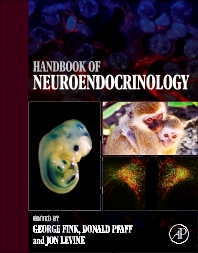LIMITED OFFER
Save 50% on book bundles
Immediately download your ebook while waiting for your print delivery. No promo code is needed.
Neuroendocrinology, the discipline concerned with how the nervous system controls hormonal secretion and how hormones control the brain, is pivotal to physiology and medicine. Ne… Read more

LIMITED OFFER
Immediately download your ebook while waiting for your print delivery. No promo code is needed.
Neuroendocrinology, the discipline concerned with how the nervous system controls hormonal secretion and how hormones control the brain, is pivotal to physiology and medicine. Neuroendocrinology has disclosed and underpins fundamental physiological, molecular biological and genetic principles such as the regulation of gene transcription and translation, the mechanisms of chemical neurotransmission and intracellular and systemic feedback control systems. Reproduction, growth, stress, aggression, metabolism, birth, feeding and drinking and blood pressure are some of the bodily functions that are triggered and/or controlled by neuroendocrine systems. In turn, neuroendocrine dysfunction due to genetic or other deficits can lead, for example, to infertility, impotence, precocious or delayed puberty, defective or excessive growth, obesity and anorexia, Cushing’s Syndrome, hypertension or thyroid disorders. These as well as neuroendocrine tumors are some of the themes covered in the 36 chapters of the Handbook. Drafted by internationally acknowledged experts in the field, the Handbook chapters feature detailed up-to-date bibliographies as well as "how do we know?" call out sections that highlight the experimental or technical foundations for major concepts, principles, or methodological advances in each area. Aimed at senior undergraduate and graduate students, post-doctoral fellows and faculty in neuroscience, medicine, endocrinology, psychiatry, psychology and cognate disciplines, the Handbook of Neuroendocrinology satisfies an unmet need that will prove useful at the laboratory bench as well as in the office.
Researchers and clinicians in the fields of neuroendocrinology and behavior; graduate students in neuroscience and related disciplines (psychiatry, neuropharmacology, medicine & veterinary medicine); medical residents
List of “How Do We Know?” Boxes
Preface
About the Editors
List of Contributors
Notes on Nomenclature
Chapter 1. An Introduction to Neuroendocrine Systems
Chapter 2. Neuroendocrine GPCR Signaling
Chapter 3. Neuroendocrine Feedback Control Systems
Chapter 4. Evolution of Reproductive Neurohormones
Chapter 5. Neural Control of the Anterior Lobe of the Pituitary Gland (Pars Distalis)
Chapter 6. Neural Control of the Posterior Pituitary Gland (Neurohypophysis)
Chapter 7. Neural Control of the Intermediate Lobe of the Pituitary Gland (Pars Intermedia) and Proopiomelanocortin
Chapter 8. The Hypothalamic–Pituitary–Adrenal Axis and Neuroendocrine Responses to Stress
Chapter 9. Neuroendocrine Control of Reproduction
Chapter 10. Lifetime Regulation of Growth Hormone (GH) Secretion
Chapter 11. Neuroendocrine Regulation of Development, Growth and Metabolism – Thyroid
Chapter 12. Circadian Rhythms in Neuroendocrine Systems
Chapter 13. Cardiovascular Neuroendocrinology
Chapter 14. Neuroendocrine Regulation of Food Intake
Chapter 15. Neuropeptide Regulation of Stress-Induced Behavior
Chapter 16. Neuroendocrine Regulation of Body Water and Electrolytes
Chapter 17. Sexual Differentiation of Brain and Behavior
Chapter 18. Corticosteroid Actions on Neurotransmission
Chapter 19. Neuroendocrine Mechanism of Puberty
Chapter 20. Sexual Behaviors
Chapter 21. Stress and Brain Function
Chapter 22. Neuroendocrinology of Aggression
Chapter 23. Chronic Social Stress
Chapter 24. Estrogen and Cognitive Aging in Women
Chapter 25. Hormones, Mood and Affect
Chapter 26. Hormones and the Aging Brain
Chapter 27. Kallmann Syndrome and Other Causes of Hypothalamic Hypogonadism and Related Development Disorders
Chapter 28. Parental Behavior and the Perinatal Programming of Infant Development
Chapter 29. Disorders of the Hypothalamic–Pituitary–Adrenocortical System
Chapter 30. Disorders of the Hypothalamic–Pituitary–Gonadal Axis
Chapter 31. Disorders of the Hypothalamic–Pituitary–Thyroid Axis
Chapter 32. Neuroendocrine Growth Disorders – Dwarfism, Gigantism
Chapter 33. Neuroendocrine Inherited or Induced Aromatase Enzyme Deficits
Chapter 34. Pituitary Adenomas
Chapter 35. Neuroendocrine Tumors
Chapter 36. Psychoneuroendocrinology
Subject Index
Author Index
GF
DP
JL